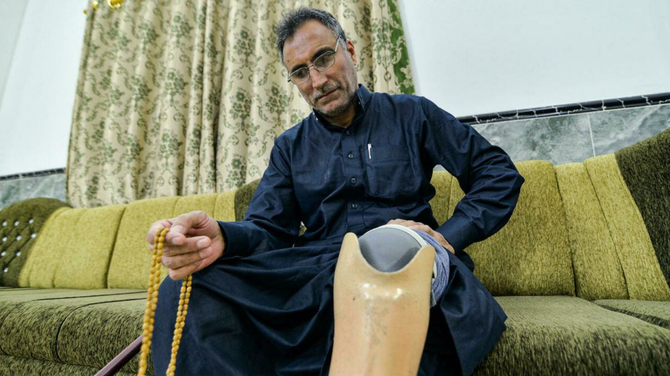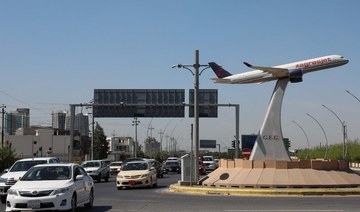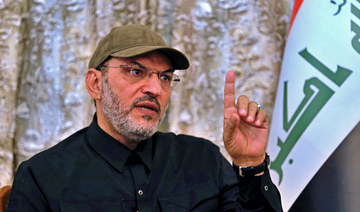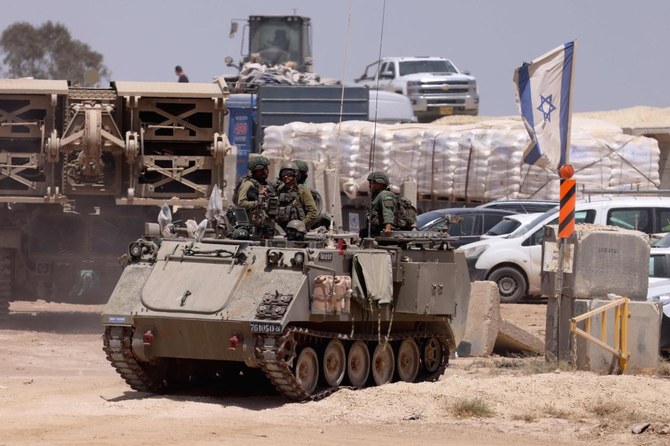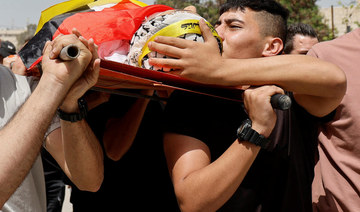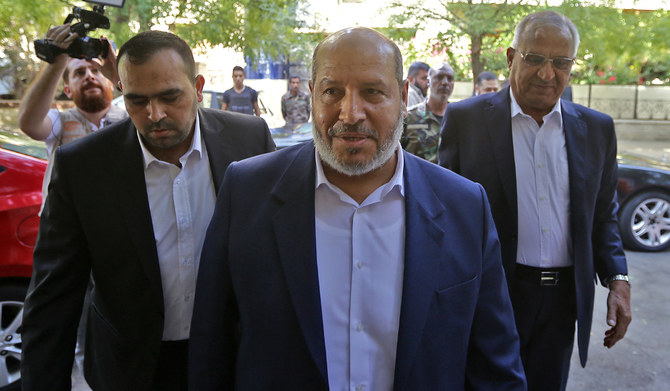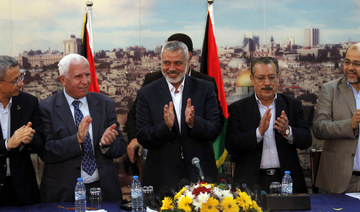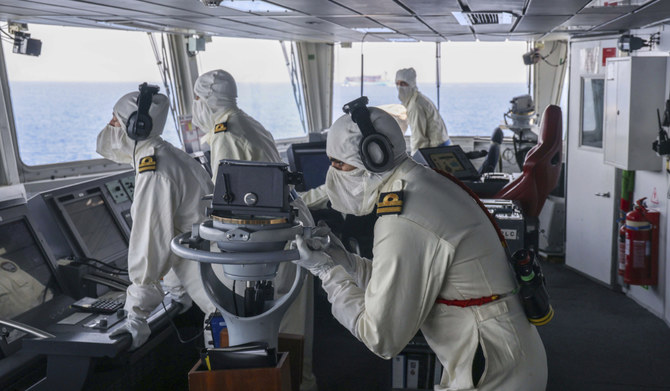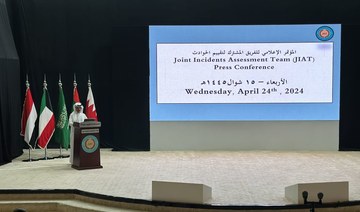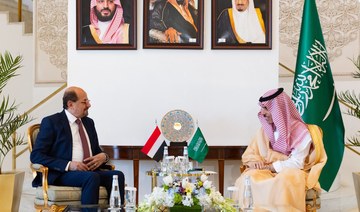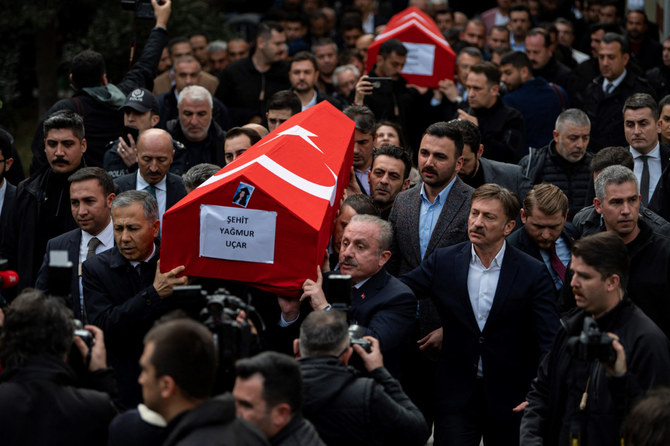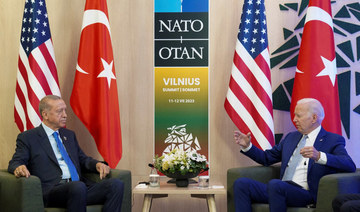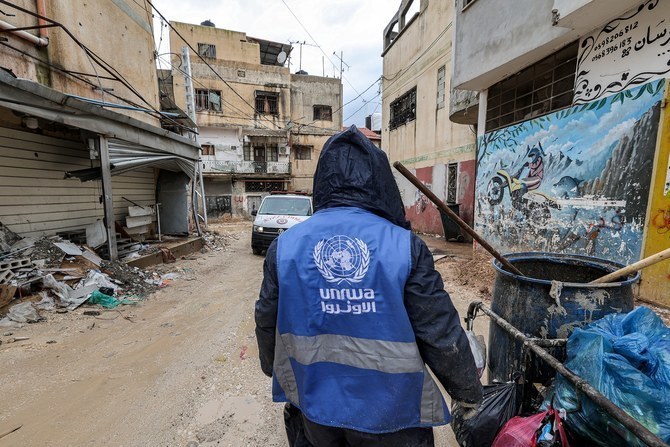MOSUL: It was March 17, 2017. Troops from the US-led coalition fighting militants in Iraq were advancing on Mosul’s Old City, squeezing out the Daesh militia.
But just months before the recapture of the city, where Daesh had declared its caliphate in 2014, a new human toll was added to the growing tragedy when it was revealed more than 100 civilians had been killed in a single coalition air strike.
The coalition has now admitted more than 1,000 civilian lives were lost in the seven-year operation against the militia in Iraq and Syria.
And for the first time the coalition has revealed to AFP that it has compensated the families of 14 victims in Iraq.
Four years after the carnage from which he miraculously escaped alive with his son, Abdullah Khalil is still waiting for compensation. His leg was amputated at the knee and his back is covered in deep welts and burn scars.
But he’s still trying to find out where and how to claim any damages due to him.
In the war against Daesh in Iraq, which the coalition fought mainly from the air, there were no commanders on the ground handing out “blood money” to bereaved families, as has been the case in other Western operations elsewhere.
The compensation system is opaque even for those with expertise, says Sarah Holewinski, Washington director for Human Rights Watch.
“They have sometimes paid, sometimes not. We need degrees to figure out laws and channels,” she told AFP.
“I can’t even imagine being an Iraqi woman who has lost her mother trying to figure out not just, do I have any kind of compensation, but how do I get some American to say ‘hey that was actually one of our bombs’.”
It was one of those American bombs that changed the life of former truck driver Khalil on Friday, March 17, 2017, “at 8:10 am exactly” in Mosul Al-Jadidah — New Mosul in Arabic.
“There was a bombing and I was buried under rubble” until “around 11:00 am, when I heard people coming to rescue us,” said the 51-year-old.
The explosion and collapse of the building where he had been sheltering with dozens of women, men and children caused the largest single civilian death toll in the fight against Daesh.
“At least 105 and at most 141 non-combatants” were killed, according to the non-governmental group Airwars, which monitors civilian deaths in bombings around the world.
For Iraqis, the shock was immense. But it was quickly overwhelmed by the general chaos. In the 72 hours before, during and after that one strike, hundreds more civilians died during fighting in Mosul.
It is often difficult to determine where the strikes originated: in this city of more than two million people the militants used hundreds of thousands of trapped civilians as human shields. Iraqi troops fired at will, militants responded in force and coalition planes shelled the city relentlessly.
On March 17, 2017, five months to the day after the launch of the last major battle to recapture Mosul, Iraqi troops were trying to advance through the Old City’s narrow alleyways.
Ahead of them, to the west, was the Mosul Al-Jadidah district with its railway station and fuel silos. From there, shots were being fired, apparently by two snipers squatting on a rooftop of a residential building.
The Iraqi army, caught up in the toughest urban guerrilla battle in its modern history, called in a strike by the 75-country coalition to help defeat the militants in their self-proclaimed “capital.”
American planes were deployed, dropping a guided missile.
But they were missing a crucial piece of information: in the basement of the building dozens of civilians were huddled together, praying that the nearby Rahma hospital and a busy street would prevent international aircraft from firing on the area.
Facing global outcry, for the first and only time in the long battle against Daesh in Iraq and Syria, the US dispatched investigators into the field.
As early as May 2017, they acknowledged that 105 civilians had died and 36 were missing, saying they hoped they had escaped.
But they concluded the building had collapsed due to Daesh explosives stocked on various floors, ruling out direct responsibility.
In Mosul, witnesses and survivors are adamant that no arms arsenal was stored in the building and the US army itself provides no proof, basing its conclusion solely on theoretical calculations of the load that would be required to bring down the building.
“There were two snipers on the roof and they dropped a 500-pound bomb. It was the wrong weapon to use,” Chris Woods, director of the London-based Airwars, told AFP.
“You cannot use high explosive, wide area effect munitions in urban settings without very considerable risks for civilians, and this is exactly what Mosul Al-Jadidah represents.”
Dr. Hasan Wathiq, head of Mosul’s forensic medicine department remembers the carnage.
“With firemen and ambulance drivers, we pulled 152 bodies out of the rubble” of the building where Khalil was and others around it.
“Over the next 10 or 15 days, we pulled out a hundred new bodies every day.”
At the time, then-US president Donald Trump, who had only been in office for two months, said he “would bomb the hell out of” Daesh.
For many, the new administration had decided to give its military carte blanche, amid coalition assurances the battle was “the most precise war in history.”
But the evidence couldn’t be denied in the Mosul Al-Jadidah tragedy. The Pentagon swiftly acknowledged that it was indirectly responsible — an American air strike had hit the building — while still insisting that the building collapsed due to the secondary explosion caused by the stockpiled weapons.
When his phone rang in the autumn of 2017, Khalil was over the moon.
“A translator told me I was on the line with the coalition’s military commander for northern Iraq,” he said.
“He apologized on behalf of the coalition and promised to come see me. But it never happened.”
Walid Khaled, another Mosul resident, lost his brother and sister-in-law in the Mosul Al-Jadidah strike.
The 31-year-old father of two was actually visited by coalition investigators.
“They came to take pictures and record our statements and nothing was done to pay us compensation,” badly-needed in a city still in ruins due to a lack of reconstruction funds.
Daniel Mahanty, director of the US program at the Center for Civilians in Conflict (CIVIC) explained: “Even if the US military acknowledges that harm occurred publicly by recognizing the locations... they would not create a system by which a family could come forward with a specific request for ex gratia per se.”
Ex gratia is a voluntary payment made without recognition of liability.
“There is no claims process for ex gratia, no form to fill, and the military today is adamantly opposed to developing such a process,” Mahanty added.
“One hypothesis could be that the US does not want to develop a policy that is going to open up the door to a huge host of claims that it can’t possibly manage.”
US Democratic Senator Patrick Leahy wants more to be done.
“We need to do more to help families present claims for ex gratia payments, and to act on those claims,” the chairman of the US Senate appropriations committee told AFP.
“If the US military can’t investigate them, then we need to find others who can. It is not acceptable that these cases are ignored or forgotten,” added the veteran senator, who has recently written again to Pentagon chief Lloyd Austin about reparations in Iraq and elsewhere.
So that his brother and sister-in-law are not forgotten, Khaled has knocked on every door to get reparations in their names: he has lodged complaints with the coalition, the Iraqi Human Rights Commission and the provincial commission for Mosul compensation.
But even before launching their campaign against Daesh — which at its peak controlled a third of Iraq, swathes of Syria and carried out attacks in the heart of Europe — the 75 coalition nations had made a choice.
Unlike the invasion of Iraq in 2003 or the war in Afghanistan, when the coalition to fight Daesh was formed, there was a “specific decision” not to create a coalition-wide compensation policy, “because they did not want to spend money on that,” said Belkis Wille, former senior Iraq researcher for HRW.
“If you want compensation, you need to figure out which country was behind that specific attack and then figure out how to ask them for money,” she added.
From 2014 to February 15, 2017, the coalition would provide daily accounts of which country had carried out strikes.
But after that date, as the civilian death toll rose inexorably, those details disappeared.
And to complicate things for victims already trying to establish which plane unleashed which bomb, strikes were often carried out jointly by multiple countries.
In Mosul Al-Jadidah, the Americans swiftly admitted they had acted alone, even if they did not accept responsibility for the building’s collapse.
But according to coalition spokesman US Col. Wayne Marotto: “US domestic law and the law of war do not require the United States to assume liability and compensate individuals for injuries to their person or personal property caused by its lawful combat operations.” This applies in any country where there is a US operation.
He told AFP that since March 2015 the coalition has processed “five payments for civil loss” while a sixth is on the way “as well as eight condolence payments” in Iraq.
Washington has refused to go into any detail about where each incident happened or exactly what occurred. But each of the payments is for either human injury, death or material damage.
Those payouts still remain small compared with Afghanistan. In 2019 alone Washington paid out just $24,000 to victims in Iraq, while there were 605 payments in Afghanistan amounting to an overall figure of $1,520,116, according to Pentagon figures.
And that is despite the fact that the US Congress has agreed to $3 million in funding for compensation per year until 2022 as part of a budget for “operation and maintenance — army.”
In nine months of fierce fighting in Mosul, “so many families were devastated... that I wonder whether the Pentagon feared setting a precedent,” in awarding ex gratia payments for Mosul Al-Jadidah, which “it did not want to follow through on,” Airwars’ Woods said.
Airwars says that since 2014 between 8,311 and 13,188 civilians, including 2,000 children, were killed in Iraq and Syria.
But the coalition figures are 10 times lower.
“The US has admitted more than 1,300 deaths from their actions, the Dutch about 75 deaths, the British one, the Australians about 15 deaths and that’s it publicly,” Woods said.
“The British and French were very heavily involved in Mosul and neither country has admitted to a single civilian death” in the 2017 incident, he added.
The Dutch have compensated a Mosul man who lost his wife, daughter, son and nephew in a separate 2015 airstrike. According to Dutch media reports, he received one million euros ($1.2 million), but he has never talked about the compensation.
The Netherlands has however recognized “their Mosul Al-Jadidah” in the town of Hawija, further south, rights groups say.
The Dutch bombed a Daesh explosives production line Hawija in June 2015. The fire and cascade of explosions killed more than 70 civilians and devastated large parts of the city.
The Dutch are not paying individual compensation “but they have begun helping with the long-term reconstruction in Hawija,” Woods said, adding the Dutch government has set up a five-million-euro fund for the city.
In Mosul, where the cost of reconstruction is estimated at billions of dollars, a similar initiative would be welcome.
But the Iraqi authorities themselves were slow to address the issue of the casualties and the ruins — from which bodies are still removed to this day.
In March 2019, former prime minister Haider Al-Abadi said only “eight women and children” were killed in Mosul.
The head of the provincial human rights commission, Yasser Dhiaa, said Baghdad had taken the case of Mosul Al-Jadidah to the US State Department — in vain so far.
In other countries, the US military has been more active in compensation cases.
In Somalia, where Airwars has counted some 100 civilians killed in 14 years, the US military command for Africa (AFRICOM) has set up an online form and a postal address for registering civilian victims on its homepage.
CENTCOM, the US command for the Middle East, has no form, no address, email or telephone number on its website.
But a press statement dating from March 17, 2017, can be found on the site which mentions “four strikes” in Mosul that destroyed a series of vehicles, weapons “and an Daesh-held building.”
On that day, AFP reported that Iraqi forces had recaptured a mosque and a market in Mosul’s Old City.
Four months later, the Old City was liberated and Daesh routed in Iraq.
Abdullah Khalil at the time was just learning how to adjust his prosthetic leg, something he still struggles with to this day.



